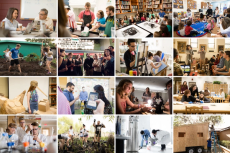Cool Class: AfroFantastic: Black Imagination and Agency in the American Experience
A new course for first-year students culminates with an exhibition at Rollins’ Cornell Fine Arts Museum.
October 29, 2020

Whether it’s George Clinton descending from a spaceship at a P-Funk concert or Black Panther joining forces with other crime-fighting Avengers on the silver screen, the intersection of black science fiction, fantasy, and Afrocentrism can be a “fantastic” place.
At Rollins, a new project-based Rollins College Conference (RCC) class is examining the complex social and political forces linked to Afrofuturism—black imagination and agency in the American experience.
Instructor
Julian Chambliss, professor of history


The Scoop
From early efforts such as Martin Delany’s Blake; or the Huts of America (1859) and Sutton E. Griggs’ Imperium in Imperio (1899) to Sun Ra’s fantastic musical revolution in the 1970s, future-oriented narratives have provided powerful markers of societal transformation.
Beyond fantastic escapism, black engagement with future visions challenges societal expectations and creates a space to reshape the meaning of the American experience.
“It’s important to study the mechanisms in which oppressed people and those outside the mainstream might search for tools to empower themselves and look beyond contemporary circumstances,” Chambliss says. “This course is like a toolkit to unpack questions of community, identity, and culture.”
Chambliss adds that the term Afrofuturism is somewhat of a misnomer. While the content is typically future-oriented, the fictional literary and cultural aesthetic often includes past or present-day utopian-like settings that deviate from an era’s dominant societal narrative.
For instance, this could include everything from a black man writing about an African-American shadow government in late 19th-century Texas (Griggs) to a jazz musician in the Civil Rights era changing his name to an Egyptian god and claiming to be on a peace-preaching mission from Saturn (Ra).

Snapshot
To cap the semester, the course’s 10 first-year students will contribute interpretative frameworks for the AfroFantastic exhibition January 14 through April 2 at the Cornell Fine Arts Museum (CFAM).
When we caught up with the class in the fall, students were studying how universalism, binarism, and religion impacted America’s post-colonial era. In addition, they were examining pieces that will be on display in the exhibit, conceptualizing various ways to design the galleries.
Some of the items on display will be books, comics, artwork, and abstracts from the Alfond Inn collection.

Student Perspective
Germain Neizil ’20, a social entrepreneurship major, likes how the class uses a sci-fi theme to depict the intricacies of black history and culture.
“I am astonished by the wealth of influential African-American historical figures that I was previously unaware of,” he says. “Dr. Chambliss has introduced me to a new world where every turn is a discovery that feeds my curiosity.”
Sara Bornett ’20 says she didn’t learn much about African-American history in high school. But “being in this class,” she explains, “has helped me to tie an emotional connection with the past of my people. I deeply appreciate Rollins offering this course.”

Did You Know?
At Rollins, a variety of academic disciplines integrate their curriculum with CFAM. In recent years, the museum has benefited from students:
- Translating Spanish label texts in the Clive Gallery
- Developing on-campus marketing campaigns for the museum
- Performing classical music in the galleries
- Writing and recording audio guide stops
- Estimating proposed investment values for works in the permanent collection
- Volunteering and serving internships
“We always emphasize that we are a teaching museum,” says Amy Galpin, CFAM curator. “We are here to serve our campus community and to share this space with all students.”
- Categories:
- History |
- Art History |
- Rollins Museum of Art |
- Cool Classes |
- Academics

Recent Stories
February 06, 2026
Lady Gaga’s “Won’t You Be My Neighbor” Tribute to Rollins Alumnus Fred Rogers
John Sinclair, a professor of music at Rollins College, shared his thoughts on Lady Gaga's rendition of "Won't You Be My Neighbor" for a 2026 Super Bowl commercial. The song was originally composed and performed by Rollins alumnus Fred Rogers—better known as Mister Rogers.
February 05, 2026
Advice for Soon-to-be College Graduates
Micki Meyer, Lord Family Assistant Vice President for Student Affairs-Community at Rollins College, provided advice for college students before graduating in this Orlando Sentinel Op-Ed.
February 04, 2026
Rollins Named Top Producer of Fulbright Scholars
Rollins continues its legacy of global citizenship and responsible leadership, earning recognition as a top producer of Fulbright Students among colleges and universities for the 13th time.
